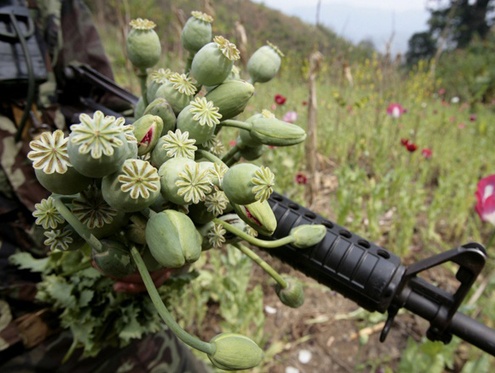Shan Drug Watch published its 2012 annual report yesterday urging a political solution with armed ethnic groups in Burma.
In the report, the narcotics watchdog argues that a political solution would more effectively curb drug production than eradication programmes, which is currently being pushed by the Burmese government.
The SDW, which is run by Thailand-based Shan Herald Agency for News, held a press conference in Chiang Mai on 26 June – the International Day Against Drug Abuse and Trafficking – to launch the report.
The document – Political Settlement: A win-win solution for all – said despite 13 years of implementing eradication programmes drug output from the region is still soaring.
In 1999, the then ruling junta launched a 15-year plan that aimed to permanently eliminate drugs from Burma. However with two years left, 18 out of 20 of the townships that had been targeted for opium elimination continue to cultivate the drug.
“Numerous People’s Militia Forces (PMF), set up by the Burma Army to assist in their operations against rebel forces, have become key players in the drug trade, both heroin and ATS [amphetamine-type stimulants]” stated the report.
“Yet government complicity in the tangled drug problem is being conveniently ignored by the international community as it embraces Burma’s new administration.”
The SDW said opium cultivation and production in Burma surged in the 2011-2012 growing season and is continuing to increase despite high-level of arrests of leading drug kingpins, such as Naw Kham in eastern Shan State’s Golden Triangle area who served in a government-backed milita on the Thai-Burma border.
“It’s time to end the vicious cycle of new druglords emerging and being scapegoated over and again. The political root causes of the drug problem must be tackled,” said Khuensai Jaiyen, principal author of the Shan Drug Watch report.
“If the government can accept these wishes [from ethnic opposition groups] then they’ll have reach to a political settlement and will no longer be enemies with each other, which will then facilitate the rule of law. Once this happens, they should be able to solve the drug problems.”
According to the World Drug Report published by the United Nations Office on Drugs and Crime yesterday, Burma remains the world’s second largest producer of opium behind Afghanistan.
In Burma “potential opium production increased from 580 tons in 2010 to 610 in 2011” – an increase of 14 percent, reported the UNODC.



